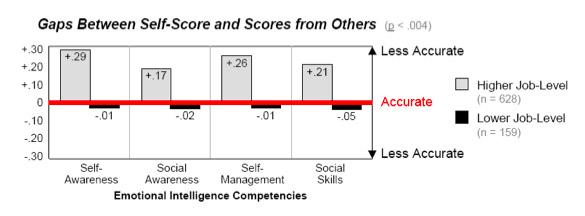
Why do good people sometimes turn out to be surprisingly bad leaders? Here’s one reason: The higher they climb, the more they lose touch with the people they lead, and the less able they are to see themselves as others see them.
The data comes from the Hay Group’s analysis of their database of 360-degree Emotional & Social Competency Index assessments. While lower-level individuals and managers showed no significant gaps between how they rated themselves and how others rated them, those at the highest levels did. Not surprisingly, they saw themselves as possessing significantly greater Emotional Intelligence than their peers, direct reports and managers did.
Can you say blind spot?
Execs are not only less likely to benefit from open dialogue and honest feedback, they’re more likely to overestimate and overvalue their performance, particularly in emotional and social situations. I can relate (see To Everyone Who Used To Work For Me, I Apologize!). I expect that you can, too.
No one sets out to be an out-of-touch leader! One day, you’re a star and then you step up–whether you leap at the opportunity or are pushed–and what you step into is a lot of messiness. You go from the top of your game to dealing with all the breakdowns, all the problems people bring to you, all the unresolved issues with power dynamics.
So how do you avoid the bubble? A strong 360-degree assessment structure backed by coaching support is a good place to start. Assessments provide new insights, highlight strengths and areas for development. Coaching directly confronts blind spots and generates personalized actions and practices for sustainable development and habit change.
We’ll be talking more about the Emotional & Social Competency Index (ESCI), a 360º assessment tool used for leadership and personal development that draws on the work of Daniel Goleman and Richard Boyatzis, in the weeks ahead. Stay tuned.

 About Us
About Us 
 SIGN UP FOR OUR NEWSLETTER
SIGN UP FOR OUR NEWSLETTER  Connect With Us
Connect With Us